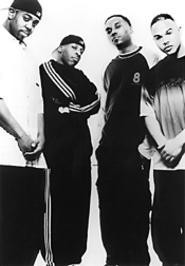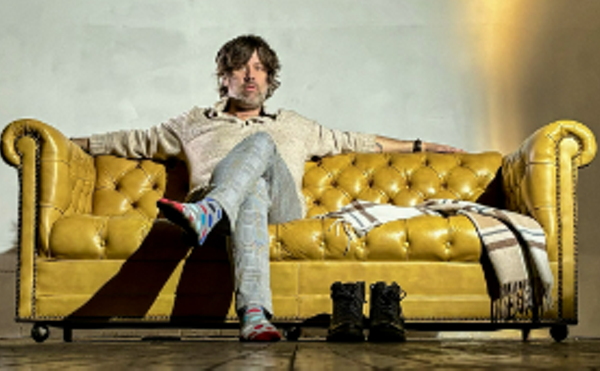DJ battalions like the Invisibl Skratch Piklz and the Beat Junkies helped elevate record-scratching and beat-juggling techniques to new levels, but it was the four members of New York City's X-ecutioners who defined the genre with their 1997 release, X-pressions. The album positioned the DJ collective as global representatives of a movement seeking validation for what was a deeply established -- but often maligned or misunderstood -- musical form.
Though they started in 1989 with the moniker X-Men, it wasn't until 1996 that they solidified their roster with Roc Raida, Mista Sinista, Total Eclipse, and Rob Swift -- four world-class, title-winning DJs who have lent their skills to such artists as Common, Organized Konfusion, the Beatnuts, and the Jungle Brothers. What distinguished the quartet from other DJs was the way it acted more like a traditional band than an assortment of soloists.
"We'll brainstorm and come up with ideas, and then each of us will go home and try to work on our part," Swift says from his home in New York City. "We kind of give each other roles, like 'On this song, I want you to be the bass line -- Raida, you're going to be the drummer on this. I'll be the lead vocal, and Eclipse will be percussion,' and we just take it from there."
In performance, all four DJs working in unison is a mind-blowing exercise in synchronized scratching and on-the-spot improvisation. Unfortunately, it's often the shortest part of their set, broken up by long segments of solo showmanship that, while initially entertaining, quickly lose steam.
"That's something we want to try and change in the future," counters Swift. "We're talking about having a 20-minute nonstop team routine. We realize that when you see a jazz band, for example, you may have a horn player, a piano player, a drummer. They each have their solos, but the majority of the show is done playing together. That's what we're trying to emulate with what we do. The solos are shorter, and it's more of us in unison and collaborating onstage."
Attempting to explain to others what's involved in such a collaboration can be a daunting task. Swift tries to break it down: "The concept of beat-juggling is, you take two records -- they could be identical records or different records -- and what you want to do is take the kicks and snares and the hi-hats that you hear on the vinyl -- like you're a human sampler -- and rearrange them. You're basically just rearranging the pattern of the music, remixing a song in real time with your hands. The funny thing is, we spend so much time doing it, a lot of times we don't spend enough time thinking about how to explain it."
Not that Swift's had time to sit back and theorize. A nonstop touring schedule during the past four years has taken the X-ecutioners around the globe several times, allowing them to open the ears of many new fans firsthand. But it has also delayed the release of their new record, Built From Scratch, by more than a year. Finally released in February, Built is a maturation of the ideas found on X-pressions, transforming flashy competition routines into solid musical constructions. The disc features a variety of guests, from current heavy-hitting MCs like Pharaoh Monch and Kool G Rap to Tina Weymouth, on a remake of Tom Tom Club's "Genius of Love." But even more refreshing is their teaming with the West Coast DJ crew Beat Junkies.
"We were glad we got to do that, because a lot of the turntable records you listen to these days rarely feature collaborations with other DJs," Swift admits. "We were like "Yo, let's collaborate with the cats on the West Coast, to show some unification.'"
While the other three members have each made names outside of the group by DJing for high-profile hip-hop acts, it's Swift who has become the most recognizable X-ecutioner, garnering critical praise for his 1999 solo masterpiece, The Ablist. Unlike his partners, he sees no need to play the backup man for an MC. "My goal is to establish myself as an artist," he explains. "I'm glad that I'm able to go out there on my own in the world and just express myself as a DJ. I always felt that DJing for a rapper is similar to 'You can work at a prestigious company or you can own the prestigious company.' I'd rather own it and be the one to call the shots."
One could argue that Swift's decision to appear in a television ad (with Shortkut of Invisibl Skratch Piklz) for the Gap earlier this year was fraught with mixed materialistic messages. Ultimately, however, more exposure for Swift means more exposure for turntablism. "We had Gap clothes on, but we were all cuttin'," he relates. "We used 'The Matrix' by Dizzy Gillespie -- we're scratchin' over it, getting busy -- and to me, we were being ourselves. Nothing about the commercial compromised our integrity. It was just us up there -- and the beautiful thing about that is that we were able to reach a lot of people that haven't seen DJing at that level. It's already reaching the mainstream."
Indeed, in the past decade, hip-hop has permeated every aspect of American culture, from clothing to a rappin' can of Pringles, but will the masses ever accept the turntable as the musical instrument it is? Swift thinks so.
"My goal is to kind of keep breaking doors down, so that at some point in the future, you'll see DJs like myself performing at the Grammys or the American Music Awards. I saw Mixmaster Mike on the VH1 Awards, and they kept cutting to him before the commercial breaks -- they'd show his hands, and he'd be scratching. But hopefully in the future, it will be on a larger scale, where it'll just be Mixmaster Mike by himself. No Beastie Boys, no rappers, just him."












